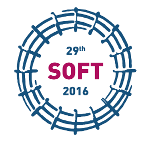Speaker
Hongli Chen
(School of Nuclear Science and Technology)
Description
Tritium breeder pebble bed plays a vital role in tritium breeding for fusion solid blanket. And thermo-physical properties of it affect the thermo-mechanical and structural design of solid blanket directly. Theoretical and experimental study on effective thermal conductivity of ceramic pebble beds have been carried out in this paper. Firstly, a new theoretical model, coupling the contact areas with bed strains, was developed to predict the effective thermal conductivity of mono-sized ceramic pebble beds. The influences of parameters such as properties of pebble and gas materials, bed porosity, pebble size, gas flow, contact area, thermal radiation, contact resistance, etc. were all taken into account in this model. Experimental platforms also have been built to take a measurement of effective thermal conductivity of ceramic breeder pebble beds (e.g. Li4SiO4 and Li2TiO3 pebble beds). Two experimental platforms using transient thermal probe method and transient plane source method respectively were successfully under operation. Li4SiO4 and Li2TiO3 pebble beds with 1 mm diameter and temperature window from 100ooC to 800ooC were considered in the experiments, and the helium purge gas with 0.1~0.3MPa were studied to assess the influence of purge gas pressure on effective thermal conductivity of pebble bed.
Keywords: effective thermal conductivity, pebble beds, theoretical method, experimental platform, solid blanket
Co-authors
Cheng Jin
(School of Nuclear Science and Technology, University of Science and Technology of China, Hefei,Anhui, China)
Hongli Chen
(School of Nuclear Science and Technology, University of Science and Technology of China, Hefei,Anhui, China)
Jie Zheng
(School of Nuclear Science and Technology, University of Science and Technology of China, Hefei,Anhui, China)
Shuang Wang
(School of Nuclear Science and Technology, University of Science and Technology of China, Hefei,Anhui, China)

